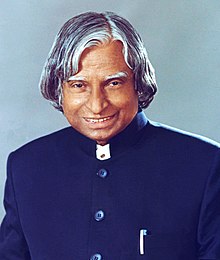A. P. J. Abdul Kalam
Dr A P J Abdul Kalam | |
|---|---|
 President of India (2002-2007), A.P.J. Abdul Kalam; the picture is from the International Book Fair, Trivandrum, in 2014 | |
| President of India | |
| In office 25 July 2002 – 24 July 2007 | |
| Prime Minister | Atal Bihari Vajpayee Manmohan Singh |
| Vice President | Bhairon Singh Shekhawat |
| Preceded by | Kocheril Raman Narayanan |
| Succeeded by | Pratibha Devisingh Patil |
| Personal details | |
| Born | 15 October 1931 Rameshwaram, British India (now Tamil Nadu), India |
| Died | 27 July 2015 (aged 83) Shillong, Meghalaya, India |
| Political party | Independent |
| Alma mater | St. Joseph's College, Tiruchirappalli Madras Institute of Technology |
| Profession | Professor, Author, scientist Aerospace engineer |
Avul Pakir Jainulabdeen Abdul Kalam (Tamil: அவுல் பகீர் ஜைனுலாப்தீன் அப்துல் கலாம்; ![]() pronunciation (help·info); 15 October 1931 – 27 July 2015) usually known as A.P.J. Abdul Kalam, was a famous Indian aerospace engineer. He was the 11th President of India, from 2002 to 2007.[1]
pronunciation (help·info); 15 October 1931 – 27 July 2015) usually known as A.P.J. Abdul Kalam, was a famous Indian aerospace engineer. He was the 11th President of India, from 2002 to 2007.[1]
When he was president, he was popularly known as the People's President. He was awarded the Bharat Ratna, India's highest civilian honour in 1997. He has also been a professor (of aerospace engineering). Kalam is the first Chancellor of the Indian Institute of Space Science and Technology Thiruvananthapuram (IIST). He is called as the "Missile Man" of India.[2]
Death[change | change source]
Abdul Kalam died on July 27, 2015 (07:45 Indian Standard Time GMT+5:30) at Bethany Hospital, Shillong after having collapsed due to cardiac arrest during a lecture he was giving at the Indian Institute of Management (IIM).[3][4]
References[change | change source]
- ↑ APJ Abdulkalam Facts
- ↑ "Kudankulam N-plant protests: Kalam steps in as mediator". Archived from the original on 2012-01-01. Retrieved 2015-07-28.
- ↑ "End of an era: 'Missile man' APJ Abdul Kalam passes away after cardiac arrest". Firstpost. Retrieved 28 July 2015.
- ↑ Anindita Sanyal (27 July 2015). "Former President APJ Abdul Kalam Dies at 83". NDTV.com. Retrieved 28 July 2015.
Other websites[change | change source]
![]() Media related to Avul Pakir Jainulabdeen Abdul Kalam at Wikimedia Commons
Media related to Avul Pakir Jainulabdeen Abdul Kalam at Wikimedia Commons
![]() Quotations related to A. P. J. Abdul Kalam at Wikiquote
Quotations related to A. P. J. Abdul Kalam at Wikiquote
- Official website Archived 2021-02-27 at the Wayback Machine
